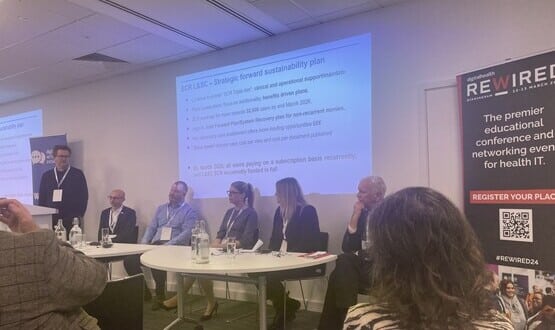‘Skype doctors’ prevent 3,000 A&E visits in Manchester

Using Skype to help older patients get faster care has prevented 3,000 avoidable A&E visits, according to NHS England figures.
The video calls have also freed up 2,000 GP appointments by allowing elderly patients to get the care they need in the comfort of their own home.
The on-call Skype NHS team takes around 8,000 calls per year from wardens working in sheltered accommodation, care home staff and community teams.
In total it equals £1.3 million and hundreds of hours of NHS staff time saved.
Not only has the programme reduced distressing hospital visits for older patients, but it’s also reduced avoidable ambulance call-outs, freeing up paramedics for emergency cases.
Peter Grace, a registered nurse who takes calls in the digital centre, said: “By setting up a direct link between services and the doctors and nurses at the hospital’s digital health team, we were able to offer guidance, advice and reassurance as well as being able to see the patient on Skype.
“Extending this to housing wardens, working with the council, has taken the project to the next level as now we can also help with issues in sheltered accommodation such as falls.”
The scheme, run in Tameside, Greater Manchester, is part of a programme of integrated services being rolled-out across the country as part of the NHS Long Term Plan, with smart use of technology enabling quicker, more personal care delivered as efficiently as possible.
Tameside has integrated its combined £1bn NHS and local council budget over the last three years, as part of Greater Manchester’s devolved health and care approach.
Trish Cavanagh, chief operating officer at Tameside and Glossop Integrated Care NHS Foundation Trust, said: “The strategic plans we have developed are aimed at improving access to care for people and looking to provide care in more innovative ways – including using technology to support this.
“In some circumstances this reduces the need for people to attend the hospital but they are still able to access expert advice in a timely manner.”
Across the country there are 14 Integrated Care Systems, which join up NHS and local government services to simplify systems between GPs, hospitals, councils and charities.
The Tameside and Glossop Care Together integrated system is part of Greater Manchester’s devolved integrated care system. It includes NHS Tameside and Glossop CCG, Tameside Council, and Tameside and Glossop Integrated Care NHS Foundation Trust, as well as close work with the voluntary sector and charities.
Together they have developed:
- The digital health and community response teams helping avoid unnecessary admissions
- The ‘Extensivist team’ – GPs and clinicians working closely with high need patients reducing A&E attendance by 58% within the cohort of patients that the team sees
- A £1.3m funding boost to the voluntary sector to provide 2,500 social prescribing referrals a year
- Home First, led by their Integrated Urgent Care Team seven days a week to help people get home in a timely way once medically fit





3 Comments
My spouse and I are exploring methods to preserve my mom living in her house without needing to worry far too much regarding her being on her own. My sister and I are generally about 90 minutes away from Mom’s house. She is in reasonably decent health right now nevertheless getting older. My pop has passed and she is living alone and wants to keep on being in her place of Thirty-two years in which we can acknowledge. We looked at medical alarm pendants but they seem out of date with all of the newer technology to choose from. Is any one making use of the Alarm.com Wellness system or at the least have any advice? It appears to be rather cost-effective and could work keeping a view over Mom who just simply won’t don an emergency button!
So did the number of A&E attendances fall at Tameside and surrounding hospitals?
Skype consumer presents a number of challenges when used as a patient facing service. Considerations need to be made around the use of these solutions in small pockets where it can fit vs use at scale where you need fit for purposes solutions that offers security and compliance in areas such as; Patient portals with waiting rooms per service, admin portals for clinicians, Reporting, maintaining clinician anonymity to name a few. Many pilots do not make it to scale as they are not easy to use either on a consumer or enterprise platform as they are not built fit for purpose.
https://modalitysystems-1.wistia.com/medias/h9ocuvtrm6
Comments are closed.